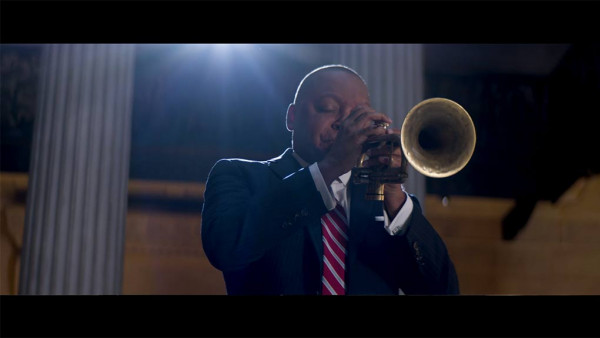What Do Democracy and Jazz Have in Common?
Trumpeter Wynton Marsalis plays America’s “unofficial anthem” — Amazing Grace — and explains how listening, improvisation and a flexible framework are essential elements of both jazz and democracy.
New York City’s Federal Hall is a place of contradictions. In the very place where the nation’s First Congress approved — in September, 1789 — the amendments that became known as the Bill of Rights, the rights that document denied have festered and deepened wounds of inequality and injustice that continue to roil the nation. Our founding history is complicated by our original sins — the narrow framework of the Declaration affirming the equality of “all men,” the constitutional protection of slavery and white supremacy, and especially relevant today, the displacement of indigenous peoples from their lands.
During the pandemic, Federal Hall has sponsored a number of virtual events revisiting that history while exploring ideas for how we as a nation might complete the unfinished work of achieving a more perfect union. This Tuesday (Oct. 13 at 5:30pm ET 2:30pm PT), the Hall is offering another virtual event, Race, Reconstruction and Voting Rights. The panel will discuss the long history of efforts to suppress Black voting, its impact on other minority voting, and challenges to voting rights that are a consequence of the Covid-19 pandemic. Moderator, WNYC Legal Editor, Jami Floyd, will be joined by Vanita Gupta, President & CEO, Leadership Conference on Civil and Human Rights; Richard Hasen, Professor of Law & Political Science, University of California, Irvine: and Rina Shah, Managing Director, Red Fort Strategies. (RSVP here.)
A few weeks ago, Federal Hall hosted a conversation on historical landmarks with artists, conservationists and activists, but the highlight of the evening was an incredible solo performance of “Amazing Grace” by trumpeter Wynton Marsalis in Federal Hall’s Grand Rotunda, a pantheon of democracy on Wall Street.
Transcript
Wynton Marsalis on Jazz & Democracy
Amazing Grace Recorded at Federal Hall
Hi, I’m Wynton Marsalis here in downtown Manhattan, Federal Hall. The Grand Rotunda – a great sounding room for trumpet!
Jazz music is the perfect metaphor for democracy.
We improvise, which is our individual rights and freedoms;
We swing, which means we are responsible to nurture the common good, with everyone in fine balance;
And we play the blues, which means no matter how bad things get, we remain optimistic while still mindful of problems.
I like to always think about the founders, and all the geniuses, and men of accomplishment, think about them in terms of the first be-boppers like Charlie Parker, Dizzy Gillespie, Thelonious Monk. They were working out fundamentals of an idea of a way to play that featured very, very quick thinking, adjustment, and the ability to have a right frame work and fill it with things of genius that also can be amended, in the same way that we work under the Constitution.
Let’s not forget that the federal Constitution has many, many fewer words than any state constitution. So they framed a very flexible and strong document that still serves us well, if we chose to follow it.
The one thing you learn as a jazz musician is how to listen. We don’t know what people are going to play, so it’s very important for us to follow them, follow very, very closely. We have a saying, if you want to find something new to play, listen to the person next to you.
The question that confronts us right now as a nation is “Do we want to find a better way to play?” And if we answer affirmative, we will make it through these things. If we answer, “No, we want to be our worst selves,” we are going to struggle.
I think Amazing Grace is a song that is our unofficial national anthem, it’s our folk anthem. John Newton wrote it and he’s not American but the roots of American music are Anglo-Celtic. And it’s about transformation.
He was a slave trader, and his ship ran into some very terrible weather. And you know when things go really, real bad, you tend to reach for the Creator. Or reach for something that is much greater than your situation. And he said, “if I come out of this, I will be transformed. I am going to change my life.” He went from being a slave trader, to an abolitionist. And this song comes out of his reawakening.
Everybody sings it, everybody plays it. It is so deeply soulful. I cannot remember a time that I did not know this song.
Amazing Grace solo performed in The Grand Rotunda, Federal Hall, Wall Street, New York City.

